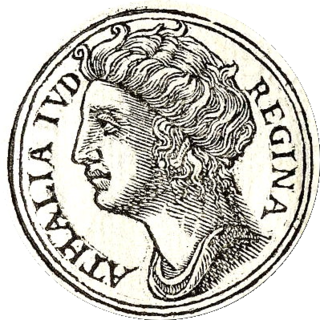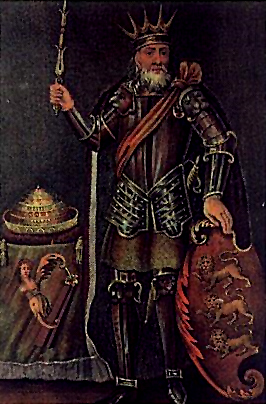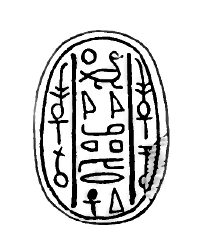
Alfred the Great was King of the West Saxons from 871 to 886, and King of the Anglo-Saxons from 886 until his death in 899. He was the youngest son of King Æthelwulf and his first wife Osburh, who both died when Alfred was young. Three of Alfred's brothers, Æthelbald, Æthelberht and Æthelred, reigned in turn before him. Under Alfred's rule, considerable administrative and military reforms were introduced, prompting lasting change in England.

Jehoshaphat, according to 1 Kings 22:41, was the son of Asa, and the fourth king of the Kingdom of Judah, in succession to his father. His children included Jehoram, who succeeded him as king. His mother was Azubah. Historically, his name has sometimes been connected with the Valley of Josaphat.

Jeroboam I was, according to the Hebrew Bible, the first king of the northern Kingdom of Israel following a revolt of the ten tribes against Rehoboam that put an end to the United Monarchy.

Solomon, also called Jedidiah, was a monarch of ancient Israel and the son and successor of King David, according to the Hebrew Bible and the Old Testament. He is described as having been the penultimate ruler of an amalgamated Israel and Judah. The hypothesized dates of Solomon's reign are from 970–931 BCE. After his death, his son and successor Rehoboam would adopt a harsh policy towards the northern tribes, eventually leading to the splitting of the Israelites between the Kingdom of Israel in the north and the Kingdom of Judah in the south. Following the split, his patrilineal descendants ruled over Judah alone.
Kings or King's may refer to:
The count of Flanders was the ruler or sub-ruler of the county of Flanders, beginning in the 9th century. Later, the title would be held for a time, by the rulers of the Holy Roman Empire and Spain. During the French Revolution, in 1790, the county of Flanders was annexed to France and ceased to exist. In the 19th century, the title was appropriated by Belgium and granted twice to younger sons of Belgian kings. The most recent holder died in 1983.

Athaliah was the daughter of either king Omri, or of King Ahab and Queen Jezebel of Israel, the queen consort of Judah as the wife of King Jehoram, a descendant of King David, and later queen regnant c. 841–835 BCE.

King's Road or Kings Road is a major street stretching through Chelsea and Fulham, both in west London, England. It is associated with 1960s style and with fashion figures such as Mary Quant and Vivienne Westwood. Sir Oswald Mosley's Blackshirt movement had a barracks on the street in the 1930s.

High King of Ireland was a royal title in Gaelic Ireland held by those who had, or who are claimed to have had, lordship over all of Ireland. The title was held by historical kings and was later sometimes assigned anachronously or to legendary figures.

Kings Peak is the highest peak in the U.S. state of Utah, with an elevation of 13,528 feet (4,123 m) NAVD 88.
A high king is a king who holds a position of seniority over a group of other kings, without the title of emperor. Similar titles include great king and king of kings. The high kings of history usually ruled over lands of cultural unity; thus high kings differentiate from emperors who control culturally different lands, and feudal monarchs, where subordinates assume lesser positions. High kings can be chosen by lesser rulers through elections, or be put into power by force through conquest of weaker kingdoms.

Meruserre Yaqub-Har was a pharaoh of Egypt during the 17th or 16th century BCE. As he reigned during Egypt's fragmented Second Intermediate Period, it is difficult to date his reign precisely, and even the dynasty to which he belonged is uncertain.
John Maddox Roberts is an American author of science fiction, fantasy, and historical fiction including the SPQR series and Hannibal's Children.

The Parthian Empire, also known as the Arsacid Empire, was a major Iranian political and cultural power in ancient Iran from 247 BC to 224 AD. Its latter name comes from its founder, Arsaces I, who led the Parni tribe in conquering the region of Parthia in Iran's northeast, then a satrapy (province) under Andragoras, who was rebelling against the Seleucid Empire. Mithridates I greatly expanded the empire by seizing Media and Mesopotamia from the Seleucids. At its height, the Parthian Empire stretched from the northern reaches of the Euphrates, in what is now central-eastern Turkey, to present-day Afghanistan and western Pakistan. The empire, located on the Silk Road trade route between the Roman Empire in the Mediterranean Basin and the Han dynasty of China, became a center of trade and commerce.
Arms of dominion are the arms borne both by a monarch and the state in a monarchy.

Turan was a province of the Sasanian Empire located in present-day Pakistan. The province was mainly populated by Indians, and bordered Paradan in the west, Hind in the east, Sakastan in the north, and Makuran in the south. The main city and bastion of the province was Bauterna (Khuzdar/Quzdar).

The Last Kingdom is a British historical fiction television series based on Bernard Cornwell's The Saxon Stories series of novels. The series was developed for television by Stephen Butchard and premiered on 10 October 2015 on BBC Two. For the second season, Netflix co-produced the series. In 2018, the series was acquired by Netflix who continued to solely produce the series for three more seasons. The series concluded on 9 March 2022 after five seasons for a total of 46 episodes. A feature-length sequel that concluded the series story, titled Seven Kings Must Die, premiered on 14 April 2023 on Netflix.

The Kings of Persis, also known as the Darayanids, were a series of Persian kings, who ruled the region of Persis in southwestern Iran, from the 2nd century BCE to 224 CE. They ruled as sub-kings of the Parthian Empire, until they toppled them and established the Sasanian Empire. They effectively formed some Persian dynastic continuity between the Achaemenid Empire and the Sasanian Empire.












